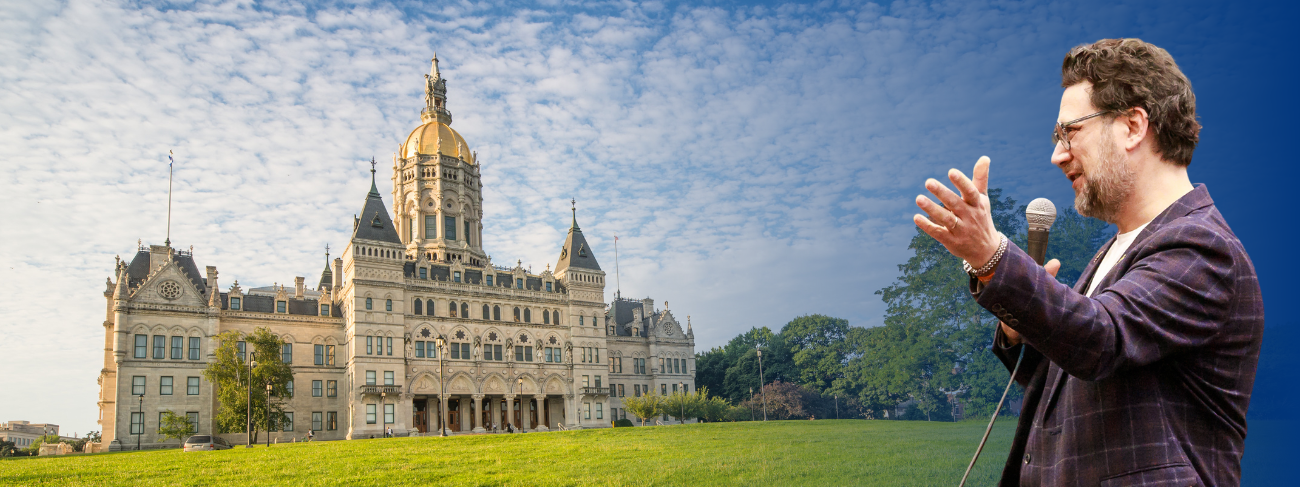An OpEd: Can CT Set The Standard on Environmentalism?
September 30, 2020This opinion piece appeared in the Stamford Advocate on September 30, 2020:
These past several months have seen large parts of the planet engulfed by unusually severe weather.
Wild brush fires lighting the sky orange on the West Coast, while fires destroy unique ecosystems in Australia and Brazil.
2020 has brought us more frequent hurricanes and superstorms in patterns that resemble what used to be “once in a lifetime” occurrences.
The complexity of climate change goes beyond unusual storms and severe brush fires. The COVID-19 pandemic is a result, in part, of our relationship to nature.

Photo: Allen J. Schaben / TNS
A crow on a Cypress Tree is silhouetted by the sun, which is partially obscured with ash from Southland wildfires in Garden Grove, California, Sept. 9.
And while COVID hasn’t set wildlife and land on fire, it has set on fire existing problems of structural racism and inequality. The impacts of the pandemic disproportionately impact the poor and people of color. And of the many lessons we are learning from this experience we have come to recognize how fragile our social welfare system is, and that environmental justice is also racial justice, economic justice, and social justice.
All of this has been created by and can be solved by us.
Just as there is an intersection of race, class, and gender there is an intersectional nature to our own biodiversity. Our lands and oceans are being affected from warming temperatures as a result of human activities and man-made emissions. CO2 and methane and other pollution heat up our atmosphere, and without the marine ecosystems in our oceans, just like the trees on land, that are responsible for oxygen production and carbon absorption, the temperature would dramatically go up. Our oceans are the climate regulators and its biodiversity is keeping us alive.
The whales, keystone species, are continuing to disappear, threatened by pollution of all sorts. As this happens, the less we are protected from the devastating impacts of climate change. The whales are the gardeners of the seas and maintain the phytoplankton that absorbs carbon, that produces 60-80 percent of the oxygen in the air we breathe and that is the food for the zooplankton (baby fish and crustaceans).
It is important to see the links that hold our planet together.
We must challenge the economic and political ways in which we extract, create and distribute energy. Our emerging market for environmentally friendly, renewable energy: wind, solar, and water can break our dependence on fossil fuels, but cannot come at the cost of its own environmental destruction. With green jobs and technology, come green practices and priorities. Building in a way that is safe to our environment and without the extraction of resources and people that currently result in income inequality and social ills.
We are experiencing the largest expansion of offshore wind technology in the nation in the waters in front of New England. The state is moving forward with a new fracked gas plant in Killingly. These decisions will have environmental consequences. It’s our responsibility to ask what those are and hold our leaders and each other accountable for reducing or eliminating that risk.
As we are in the midst of a presidential election, now is the time to see what policies harm our environment on the federal level and ask our leaders what we can do differently and better. Subsidies to oil and gas industries that promote fracking, shale fracking, and offshore drilling have come at a huge environmental cost. Subsidies to animal agriculture, one of the most cruel industries, produces significant pollution in our air and soil and is in part responsible for oceanic dead zones. Subsidies to heavy gear industrial fishing have participated primarily in the loss of 90 percent of fish in our oceans. With the subsidies we pay these industries, we can support clean plant agriculture, ensure the small fishermen get paid to retrieve trash and make a living with the reusing of that trash. We can feed and support every household affected by the pandemic and provide universal health care for every person in America. It’s simply a matter of choosing our priorities.
Connecticut has proven itself as a role model for the nation. We can set the standard when it comes to environmentalism. Living in a clean and protected environment means serving those most suffering from our environmental degradation and its resulting economic inequality. We can and must be the change we seek.
David Michel is state representative for Stamford’s South End, Shippan and downtown.





